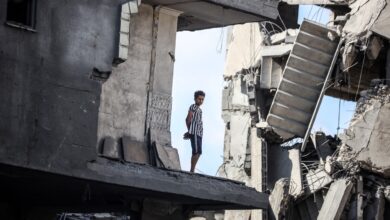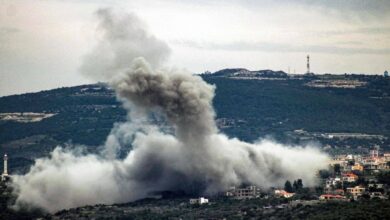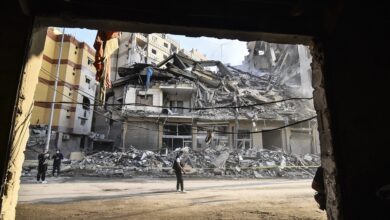
Three Hamas members were killed late on August 27 in two explosions targeting Hamas checkpoints in the Gaza Strip. The first explosion took place in southern Gaza, killed two Hamas security personnel and wounded another. One hour later, a second blast killed another Hamas member and wounded several others in an unspecified location in the western part of Gaza.
The blasts later turned out to have been caused by suicide bombers. Immediately after the incidents, Hamas declared a state of emergency that led to the arrest of multiple suspected Salafi jihadists across the Gaza Strip over the following days.
While some of the suspected Salafi jihadists operating in Gaza are unaffiliated individuals, several groups active in the coastal enclave include the pro-Islamic State Sheikh Omar Hadid Brigade, Ahfad al-Sahaba fi-Aknaf beit al-Maqdis, and Liwa al-Tawhid. Interestingly, many of these groups’ operatives are former members of prominent Palestinian factions, such as Hamas, the Palestinian Islamic Jihad, and even the secularist Popular Front for the Liberation of Palestine.
Although relatively rare, such attacks are not unprecedented, as periodic attacks by Salafi jihadists and ISIS-inspired militants have targeted Hamas officials in the Gaza Strip. In August 2017, a Hamas security officer was killed in a suicide bombing by a pro-ISIS militant at a checkpoint in the vicinity of the border with Egypt.
The timing of the attacks is not a coincidence, as they come amidst ongoing tensions between Israel and Hamas, as well as the latter’s efforts to gain concessions from Tel Aviv. Hamas has in recent weeks turned a blind eye to fringe elements in Gaza, including pro-ISIS elements, likely allowing them to infiltrate into Israel and conduct an armed attack against a border community near the border with Gaza. It was reported that Salafi elements were involved in at least one of the attempted infiltrations.
Furthermore, Hamas seems to have loosened its overall pressure on such groups. Over the past weeks, Gaza’s rulers have reportedly released Salafi jihadists and ISIS-inspired individuals from its prisons as a goodwill gesture. Interestingly, one of the attackers in the August 27 incidents was recently set free from Hamas’ prison.
It is possible that these groups’ new “freedom of operations” in Gaza backfired, as it also enabled them to plan and execute acts of militancy against Hamas. Additionally, the likely prevailing heightened state of alert of Hamas’ security forces, due to the tensions with Israel, may have allowed Salafi and ISIS-inspired elements to plan and move more freely within Gaza.
The interest of such jihadist elements to target Hamas stems from several motives. First, Hamas is perceived as ineffective and weak vis-a-vis Israel. Such perception is likely bolstered these days given the ongoing negotiations between Hamas and the Israeli government.
The second motivation is linked to these groups’ anti-Shia ideology. Thus, Hamas’s renewed improvement of ties with Iran (once again), as well as the Iran-sponsored activity of Shiite organizations in Gaza, likely increased the motivation of jihadist groups to target Hamas.
Such groups have constantly questioned Hamas’ religious legitimacy, despite the Palestinian faction’s Islamist creed. In addition to criticizing Hamas’ insufficient implementation of the Sharia, according to these groups’ ideology Hamas is an apostate movement. Indeed, aside from its Islamist aspirations, Hamas has a strong nationalist world view.
Lastly, it’s possible that the attacks were also motivated by the deep economic crisis and hardships in Gaza.
Over the past months, such hardships have triggered demonstrations by local residents. This is highlighted by the wave of protests during the month of March, which resulted in clashes between demonstrators and Hamas security forces, and the arrests of dozens of activists.
In addition to trying to attract the support of despairing young Gazans, such jihadist elements may seek to further destabilize the Gaza Strip and undermine the overall sense of security throughout the coastal enclave. By doing so, in the long-term, such groups could increase their foothold in the Gaza Strip.
 Asaf Day is a Middle East and North Africa geopolitical analyst at a private security-consultancy firm. His areas of expertise include Syria, Israel, and the Palestinians, as well as global jihad organizations.
Asaf Day is a Middle East and North Africa geopolitical analyst at a private security-consultancy firm. His areas of expertise include Syria, Israel, and the Palestinians, as well as global jihad organizations.
Asaf has an MA Degree in Arabic Studies and a BA in Middle Eastern Studies. In addition to English, Asaf speaks fluent Hebrew and Arabic, as well as Turkish and French to a lesser degree.
All views and opinions expressed in this article are those of the author, and do not necessarily reflect the opinions or positions of The Defense Post.
The Defense Post aims to publish a wide range of high-quality opinion and analysis from a diverse array of people – do you want to send us yours? Click here to submit an Op-Ed.











